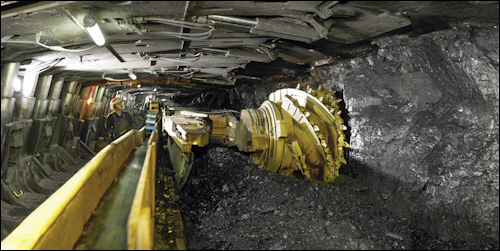
Underground coal mining is a capital-intensive business. Do state tax credits really make a difference?
The House of Delegates has passed a bill sponsored by Del. Terry Kilgore, R-Scott, in the House and Sen. Ben Chafin, R-Russell, that would provide state tax credits for the production of metallurgical coal.
The legislation, which would offer $200,000 in tax credits next year and about $500,000 the year after, is more modest than previous efforts, which would have cost the state some $7.3 million in coal tax credits. But former Governor Terry McAuliffe vetoed those bills, and Kilgore is hoping that the scaled-back version will pass muster with Governor Ralph Northam.
“At some point and time, you’ve got to figure out how to move forward, and this is how we move forward this year,” Kilgore said, as reported by the Roanoke Times. Reinstating the credits would help protect the remaining coal jobs in Southwest Virginia’s struggling coalfields region, he added.
Bacon’s bottom line: Coal production and coal employment have plummeted in Southwest Virginia over the past three decades, and the mountainous region has not found an industry to replace it. I’m not persuaded, however, that $200,000 or even $500,000 a year will make much difference. Virginia has been mining coal for more than a century, and the most accessible coal seams are played out. The remaining coal lies in seams that are either very thin and expensive to mine or deep underground and expensive to mine.
The state is blessed by one thing, however: the high quality of the coal. Virginia coal tends to have the characteristics that make it appropriate for conversion into coke, which is used in making steel. Metallurgical coal, which is currently enjoying an export boom, accounts for 60% to 70% of the coal coming from Southwest Virginia. Deep underground mines cost tens of millions of dollars to develop, and the big coal companies don’t make that kind of commitment unless they have long-term contracts that lock in the price. Compared to the cost of developing a new mine or keeping an existing one open, a half million dollar tax credit sounds like a drop in the bucket. I would like to see the evidence that the tax credit will encourage additional production.
Rather than doubling down on an inevitably declining coal industry — when the coal is gone, it’s gone and nothing can bring it back — I would urge Southwest Virginia’s legislators to consider applying their energy and creativity to diversifying the economy.
I know of two technologies being developed at Virginia Tech that could bring economic benefits to the region. One is a laser sensor that can be deployed in underground mines to detect methane, carbon monoxide, and carbon dioxide for the purpose of averting explosions like the one that killed 29 miners at the Upper Big Branch mine in West Virginia in 2010. That technology, if deployed, could create a significant business opportunity for a Southwest Virginia engineering firm.
Another technology would process gob piles — the mountains of waste resulting from the separation of coal from mineral rock. Gob piles contain considerable coal fines. Another Virginia Tech technology would capture those fines along with other potentially valuable minerals. That innovation holds out the potential for extracting wealth from the massive gob piles dotting the coalfields in Virginia, the Appalachian coalfields, and even the rest of the world.
Then there’s the idea of rebuilding the regional economy in part around outdoor tourism. A half million dollars a year arguably would do a lot more to jump-start positive change in that direction than it would to rejuvenate coal mining. The Bacon family is planning a vacation this fall to New England, and I’m especially looking forward to seeing if the small mountain towns of the People’s Republic of Vermont are bucking the trend of rural decline. I would be delighted if Mr. Kilgore and Mr. Chafin should decide to join us in looking for alternate models of economic development!


 The Bacon family is heading off for its semi-annual vacation today. I will consider the trip a success if we spot howling monkeys like these in the wild. Any guesses at to which country we’re visiting?
The Bacon family is heading off for its semi-annual vacation today. I will consider the trip a success if we spot howling monkeys like these in the wild. Any guesses at to which country we’re visiting?



